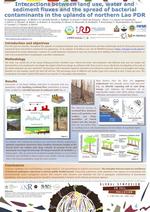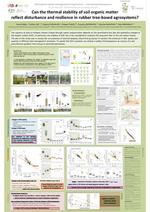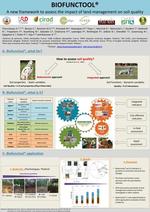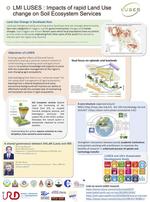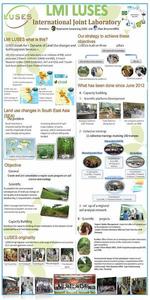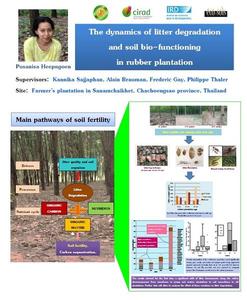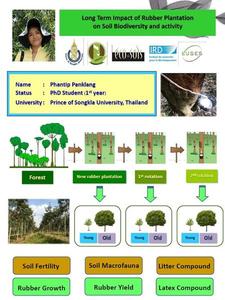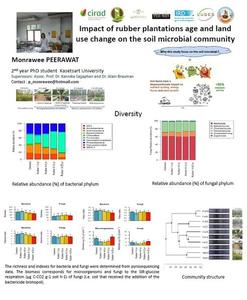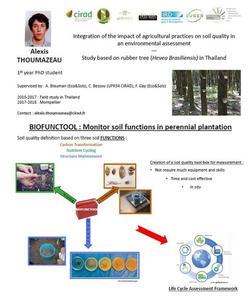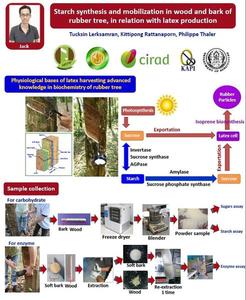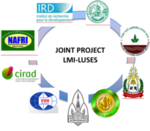OMM - organic matter management: respective effect of compost and vermi-compost on soil and plant.
OMM - organic matter management: respective effect of compost and vermi-compost on soil and plant
Compost (COMP) and vermi- compost (VCOMP) are two common forms of organic matter amendments. Agronomical experiments aimed at testing the benefits of these organic fertilizers almost exclusively focus on one of these two products and omit to compare their respective characteristics and benefits. Further, there is a lack of simultaneous comparison of the soil biological, physical and chemical changes induced by COMP and VCOMP additions. In this context, it is extremely challenging to make informed decisions and to produce reliable recommendations about the management of organic inputs. In addition, while compost is relatively straightforward to produce, there are more skills and investments involved in VCOMP based systems. It is therefore important that comparisons of the respective effects of COMP and VCOMP on crop performance and soil properties are carried out so as to document more accurately their respective domains of applicability, considering biophysical and socio-economic constraints inherent to the various farming systems that prevail across Southeast Asia. Designing and carrying out such comparisons, on the basis of pot or mesocosm experiments in semi-controlled conditions has so far been the main focus of activities conducted under the Organic Matter management (OMM) pilot project. It is planned that, with the requested extension of LUSES, such experiments will be replicated and that, based on first results, comparisons based on field experiments will be implemented to finally be in a position to make more relevant recommendations to farmers or relevant stakeholders about the most appropriate ways of using organic matter inputs, depending on a range of factors (soil texture, plant types, economical profitability compared to increased working duration, etc.).
It is currently considered that soil biological activity stimulation resulting from organic matter addition is an efficient way i) to rehabilitate cultivated soils degraded by decades of intensive mining agriculture, ii) to maintain soil productivity in the context of peri-urban agriculture and iii) to recycle urban organic wastes. Indeed, the relations between organic matter addition, biological activity, and ultimately soil characteristics and plant development are complex, because they are multifactorial and encompass a wide range of interaction and feedback processes.
The practical research actions undertaken so far by OMM have consisted of:
1. Comparing the characteristics of compost and vermicompost made from similar primary organic material;
2. Measuring the effects of compost and vermicompost derived from similar primary organic material on (i) soil physical, biological and chemical characteristics and on (ii) crop growth (maize was used as a model plant for this purpose), with a special emphasis on the respective effects of vermicompost and compost on crop tolerance to drought, as some experiments indicated such positive effects of vermicompost, but without any comparison with similar putative effects of compost or other organic amendments.
As in the case of other LUSES pilot projects, an objective of OMM concomitant with that of generating sound new knowledge is to strengthen the capacity of researchers form regional partner institution with regards to research methodologies and techniques relevant to the study of the impacts of organic amendments on soil functioning and crop growth (from various fields ranging from soil science / soil physics, plant ecophysiology, soil biology & microbiology, etc.). As in all the other LUSES research actions, this is mostly achieved through “on the fly” training sessions that are fully integrated into the workflow of research actions undertaken under the umbrella of OMM.
Further OMM work to be developed during the second phase of LUSES includes up-scaling experiments to the field scale in order to confirm the relevance of preliminary results from pot experiments. The general objective of these forthcoming activities will be to test innovative ways of using organic wastes, through composting and vermicomposting, as organic amendments for organic food production by market gardening & smallholder farmers. Questions that OMM aims to address in the future are whether and how organic amendments represent a way to stimulate soil biological activity; how this may, in turn, help maintaining or improving soil quality; and ultimately, whether this represents a practical and effective way of achieving more stable yields despite the increasing burden of climate change. Specifically, field experiments will be designed and implemented to assess the threshold amounts of organic amendments beyond which additional inputs have no, or only marginal beneficial effects (‘optimum law’), in an effort to optimize the quantities of raw material and the labour input that should be recommended depending on soil physical, chemical and biological properties, crop, farm size, farmer’s access to resources etc. A proposal describing the work plan of these forthcoming activities has already been drafted. Another direction to explore will be to assess the potentially negative externalities of organic amendments such as deep nutrient drainage and ways to minimize them (through, e.g. appropriate rotations where nutrients leached by a first crop are retrieved by a subsequent, deeper rooted crop => with potential linkage with “Deep Frontier” project, University of Copenhagen, which A. Pierret is involved in as member of the scientific committee). Linkages with the Faculty of Agriculture, Chiang Mai University (CMU) will also be developed with regards to their expertise in the field of organic fertilization.
LMI LUSES Posters
Presentation of the ECOFILTER Team at the Global Symposium on Soil Pollution (GSOP18), FAO, Rome, 2-4 May 2018
Poster of the BIODIV TREE team presented at the SOM management conference held in Braunsweig on the 30 and 31 of May
Poster of the BIODIV TREE team presented at the SOM management conference held in Braunsweig on the 30 and 31 of May
Synopsis of LUSES 2017-2019
- LDD-IRD a long history of scientific cooperation
- Impact of Rubber Tree Plantation on Soil Biological Diversity
- LDD-LMI LUSES Platform of Microbiology
- LMI LUSES presentation
- PCR LDD-LMI LUSES Platform
- Laboratory guide: hygiene and safety in English
- Laboratory guide: hygiene and safety in Thai
PhDs students' scientific posters
The dynamics of litter degradation and Soil-bio functioning in Rubber plantation : Pusanisa Heepngoen
Long term impact of Rubber Plantation on Soil biodiversity and Activity: Phantip Panklang
Impact of Rubber Plantation age and Land use change on the soil microbial community : Monrawee
Integration of the impact of agricultural practices on soil quality in an environmental assessment : Alexis
Starch Synthesis and Mobilization in wood and bark of rubber tree, in relation with Latex production : Tuksin




